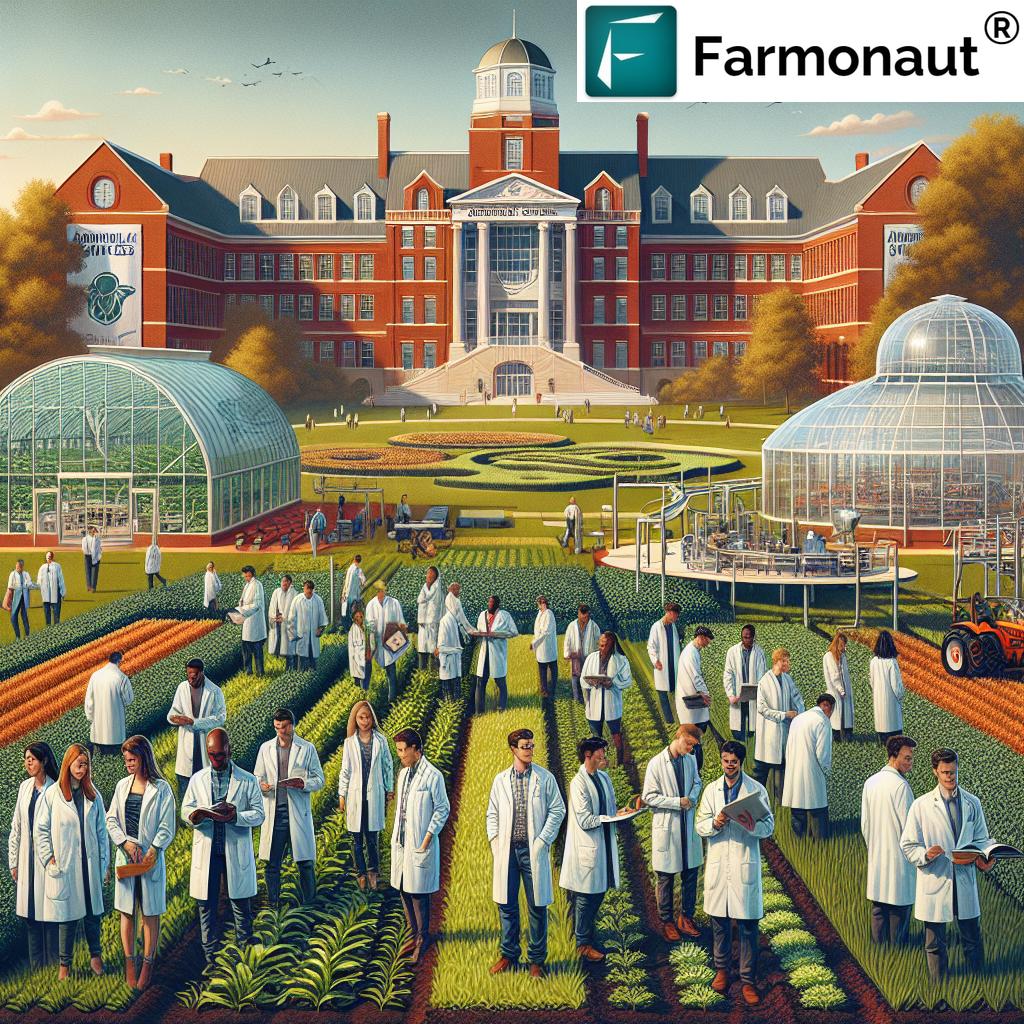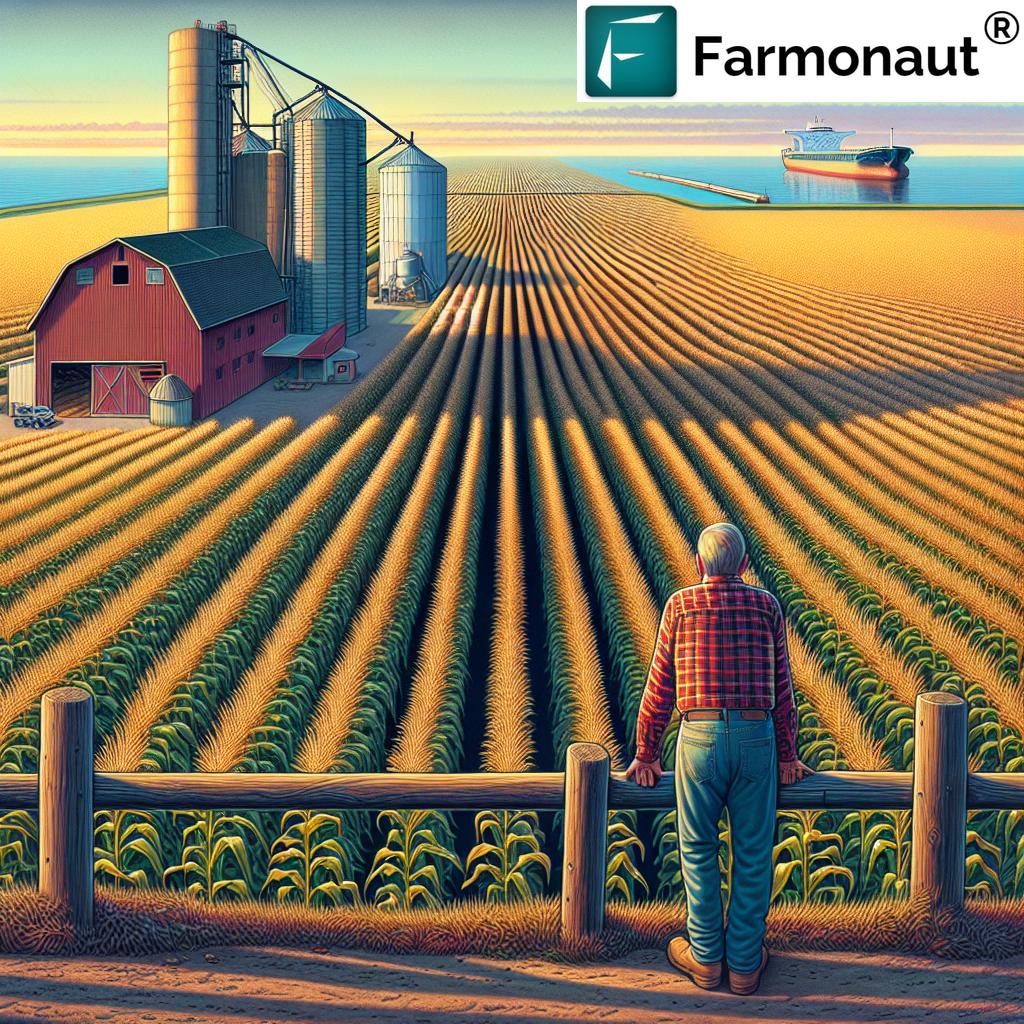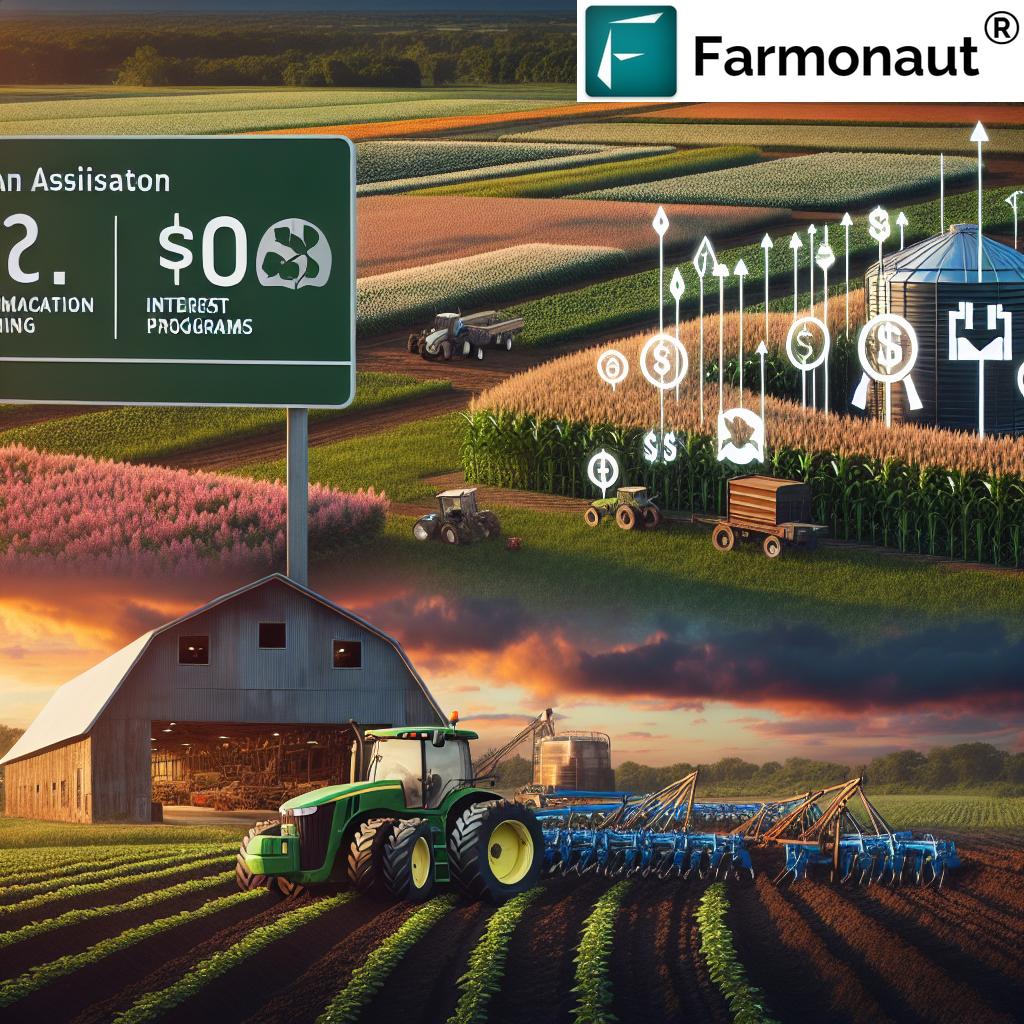South Carolina Agriculture 2025: Innovative Trends & Growth
“By 2025, over 60% of South Carolina farms are expected to adopt precision agriculture technologies for crop management.”
“South Carolina’s agricultural tech sector is projected to grow by 18% annually, driving innovation in sustainable farming practices.”
Agriculture in South Carolina: A 2025 Overview
South Carolina’s agriculture remains a vital component of the state’s economy and cultural heritage in 2025, weaving a story of tradition, innovation, and sustainability. Situated in the southeastern United States, South Carolina benefits from favorable climate zones, diverse soils, and a growing, supportive population.
The agriculture of South Carolina encompasses a dynamic mixture of crops, livestock, and forestry, underlining its significant role not only as a food producer but as a steward of the region’s natural resources. In 2025, agricultural management practices are strongly influenced by advances in precision agriculture, sustainability frameworks, and smart-farming technology.
The sector continues to thrive, with major commodities like corn, soybeans, cotton, tobacco, peanuts, and sweet potatoes dominating both local consumption and export markets. The state is not just keeping pace—it is leading innovation in sustainable and resilient farming practices.
Key Trends and Innovative Technologies in South Carolina Agriculture 2025
The state’s agricultural sector in 2025 is experiencing a digital transformation. South Carolina farmers are increasingly adopting smart-farming solutions, and precision agriculture is reaching the mainstream. Automation, data analytics, and sustainability principles are enabling more informed decisions, maximizing yields, and reducing environmental impacts.
Below, we compare the top trends and technologies shaping agriculture in South Carolina for 2025:
| Trend/Innovation | Description | Example Crop/Application | Estimated 2025 Adoption Rate (%) | Projected Impact |
|---|---|---|---|---|
| Precision Agriculture | Use of site-specific data, GPS, and satellite imagery for targeted applications | Corn, Soybeans, Cotton | 60+ | 15–25% average yield boost, reduced input cost, improved sustainability |
| Drone-Based Monitoring | Aerial surveys for crop health, disease, and optimizing application of fertilizers and pesticides | Sweet Potatoes, Peanuts, Peaches | 47 | Better disease detection, timely interventions, higher ROI |
| Regenerative Practices | Emphasis on cover cropping, no-till, and soil microbiome health | Soybeans, Cotton, Vegetables | 32 | Soil fertility, carbon sequestration, long-term productivity gains |
| IoT Sensor Deployment | Sensors track soil moisture, weather, and livestock health in real-time | Corn, Peanuts, Poultry | 38 | Resource savings, disease prevention, data-driven operations |
| Sustainable Irrigation | Efficient systems like drip, pivots, and remote control reduce water waste | Cotton, Blueberries, Watermelons | 41 | 35%+ water savings, boosted drought resilience, higher yields |
Crop Cultivation: Diversity and Innovation in South Carolina
The crop production landscape of South Carolina agriculture has always been rich and diverse, with new innovation adding unprecedented value. Farmers in the state cultivate a variety of key commodities:
- Corn: Essential for feed, food, and bioenergy.
- Soybeans: Major export and rotational crop.
- Cotton: Vital for the textile industry.
- Tobacco: A legacy crop, now managed with more sustainable practices.
- Peanuts: Both a food source and a nitrogen-fixing plant to support soil health.
- Sweet Potatoes: A hallmark crop and a significant export.
Sweet potatoes in particular have become a signature product, contributing significantly to both local consumption and export markets. The reliable growing season and advanced management practices help the state’s farmers thrive and adapt to market changes.
The adoption of precision farming techniques—enabled by drone monitoring, AI-based pest management, and remote-sensing analytics—helps improve yields, maintain soil fertility, and reduce chemical inputs. Farmers increasingly adopt cover cropping and integrated pest management to align with modern environmental regulations and consumer demand for sustainable food.
Increasingly, farmers rely on data-driven crop monitoring platforms such as Farmonaut’s large-scale farm management solution. These agricultural tools offer capabilities like satellite-based crop health monitoring and AI-powered advisories for disease, nutrient, or water stress. With a mobile or web app, farmers can track their crops in real time, take targeted action, and support risk reduction.
As market volatility requires diversification of agriculture, South Carolina growers are experimenting with climate-resilient crop varietals and specialty crops, improving both economic and environmental sustainability.
Specialty Crops: Peaches, Watermelons, and Blueberries
Owing to South Carolina’s favorable climate and unique soil zones, its specialty crop sector continues to grow. Through 2025, the state is a leading regional producer of:
- Peaches: South Carolina, often called the “Peach State of the Southeast,” is a top national producer. The Upstate region, in particular, is known for expanding peach cultivation with improved varietals that resist disease and tolerate variable weather.
- Watermelons & Blueberries: These specialty fruits are increasingly popular due to long growing seasons and consumer demand for locally sourced produce. The sandy soils in the Sandhills region are especially conducive to watermelon production, while blueberries thrive in the state’s microclimates.
Vegetable farming is also gaining momentum, with an emphasis on organic and sustainable practices. The rise in urban buyers, “farm-to-table” restaurants, and direct-to-consumer initiatives supports a vibrant local food movement around cities like Charleston and Columbia. Producers are increasingly using precision tools for integrated pest management and nutrient monitoring—practices that align with consumer demand and environmental regulations.
Traceability technology is a critical innovation for specialty crop markets. For example, Farmonaut’s blockchain-based traceability solutions offer transparency, allowing consumers and buyers to verify a crop’s farm origin and quality—essential for building trust in export markets and among health-conscious buyers.
Livestock and Poultry: Driving State Production
Livestock farming is another pillar of South Carolina agriculture. In 2025, poultry production is the state’s leading livestock activity, with broiler chickens ranking among the top national products, supplying both domestic and international markets.
- Poultry: South Carolina’s poultry sector is highly advanced, with AI-driven feed and health monitoring and intensive biosecurity measures.
- Hogs, Beef Cattle, and Dairy: Livestock diversification supports market flexibility and economic resilience—important in fluctuating commodity markets.
Major trends in livestock include genetics-driven productivity, precision nutrition, cooperative feed sourcing, and sustainability initiatives that align with emerging environmental policies and animal welfare expectations.
Animal farm operations are increasingly using technology for fleet management and logistics. For instance, Farmonaut’s resource and fleet management platform empowers large operations to optimize vehicle usage, budget fuel, and improve overall management of agricultural machinery and transport.
Forestry and Sustainability in South Carolina
Forestry is an economic powerhouse in rural South Carolina, leveraging the fact that over 60% of the state’s land is forested.
- Pine Timber Production: The region’s pine and mixed hardwood forests remain central to paper, pulp, and wood product industries—foundational to both local employment and export.
- Sustainable Forest Management: Modern forest management practices balance timber profit with biodiversity conservation, carbon sequestration, water retention, and renewable energy via biomass.
Farmers and land managers are implementing smart-forestry solutions such as satellite-based forest monitoring, helping with early pest and disease warnings and resource mapping. Farmonaut’s crop plantation and forest advisory platform (Forest Management Tool) grants foresters powerful tools for sustainable productivity, precise resource allocation, and compliance with climate policies.
Many rural economies in South Carolina thrive on the interdependence between crop, livestock, and forestry sectors, showcasing the dynamic role of agriculture in boosting economic development and preserving natural resources.
Facing 2025: Challenges and Resilient Solutions
Despite remarkable progress, South Carolina agriculture faces notable challenges in 2025 and beyond:
- Climate Change: With more frequent hurricanes, droughts, and erratic weather events, farmers must invest in resilient cropping systems, water management infrastructure, and drought-resistant crop varietals.
- Labor Shortages: Workforce gaps—shaped by demographics and immigration policies—are accelerating mechanization and automation, including use of robotics in planting and harvesting.
- Market Volatility: Unpredictable commodity prices and export policies drive diversification into value-added products (agribusiness, agri-tourism, direct farm markets, and niche crops).
- Environmental Regulations: Compliance with stricter environmental rules incentivizes precision agriculture, reduced chemical inputs, carbon tracking, and regenerative practices.
Many South Carolina producers now monitor their fields and herds with IoT devices or satellites for proactive resource planning, cost reduction, and climate resilience. For organizations prioritizing environmental stewardship and legislative compliance, tools like Farmonaut’s carbon footprint tracking offer real-time data on farm emissions—helping to identify, manage, and minimize environmental impacts.
How Technology is Shaping Agriculture in South Carolina
The rapid integration of technology—from digital apps and AI to machine learning and drone imagery—is revolutionizing farming in South Carolina. The goal is a balanced pursuit of higher yields, resource efficiency, sustainable practices, and transparent food systems:
- Satellite-Based Crop Health Monitoring: Daily, South Carolina farmers monitor fields via satellite to detect drought, pests, or nutrient stress. Early warning allows them to reduce inputs, improve yields, and minimize resource waste.
- AI-Driven Farm Advisory Systems: Tools like the Jeevn AI system (part of Farmonaut’s offering) provide real-time weather forecasts, crop management tips, and pest/disease alerts—empowering farmers to make data-driven decisions for maximum productivity.
- Blockchain Product Traceability: Food businesses, especially those exporting or serving health-conscious consumers, increasingly require traceability certifications. Blockchain records, such as those offered by Farmonaut (see product traceability page), ensure transparent, fraud-resistant supply chains.
- Resource and Fleet Management: Robust logistics applications simplify vehicle routing, maintenance, and safety—cutting operational costs for large farms or agribusinesses. Explore Farmonaut’s fleet management for farm machinery oversight.
- API Data Integration & Crop Loan Verification: With the Farmonaut API and developer docs, agritech developers, banks, and insurers can integrate reliable satellite/weather data into their platforms. This also supports satellite-based farm verification for crop loans and insurance underwriting (learn more).
Farmonaut: Driving Technological Advancement in South Carolina Agriculture
At Farmonaut, we are dedicated to making precision agriculture accessible and affordable for all scales of farming in South Carolina and beyond. Our mission is to blend innovative technology—such as satellite-based monitoring, AI-driven crop advisories, blockchain traceability, and efficient resource management—into traditional farming, maximizing yields, sustainability, and profit for every farmer and agribusiness.
- Our Satellite Monitoring Platform delivers daily actionable intelligence: farmers can see their crops’ health status, identify problem areas, and save costs by targeting interventions.
- Jeevn AI Advisory System empowers growers with personalized crop management and weather-based decision support—reducing risk and improving farm productivity.
- Blockchain Solutions equip supply chains with fraud-proof traceability, building consumer confidence in South Carolina produce.
- Fleet & Resource Management save operational cost and time for large-scale operations by optimizing usage, ensuring safety, and streamlining machinery logistics.
- Carbon Footprinting allows our users to track, analyze, and reduce the environmental impact of their operations—meeting sustainability requirements and future-proofing their agriculture business.
We support farmers, agribusinesses, government agencies, financial institutions, and corporate supply chains—delivering scalable, user-friendly tools via Android, iOS, web apps, and API integrations. Our platforms are designed to support both smallholder and large, enterprise-level users, accelerating agricultural innovation and sustainable growth across the state.
FAQ: Agriculture in South Carolina 2025
What are the primary crops grown in South Carolina?
In 2025, corn, soybeans, cotton, tobacco, peanuts, and sweet potatoes lead field production, with peaches, blueberries, watermelons, and organic vegetables thriving in specialty crop markets.
How is technology supporting agriculture in South Carolina?
Technology is at the heart of the state’s agricultural innovation—including satellite crop monitoring, precision irrigation, drone surveillance, AI-powered advisories, blockchain-enabled traceability, and real-time fleet/resource management.
Why is precision agriculture important?
Precision agriculture allows farmers to optimize input usage (fertilizers, water, chemicals), target resources efficiently, boost yields, and comply with environmental regulations—ultimately improving economic returns while safeguarding future productivity.
What are the main challenges for South Carolina agriculture in 2025?
Key challenges include climate change (extreme weather), market volatility, labor shortages, resource constraints, and new environmental compliance requirements. Innovative solutions—like resilience-focused cropping and technological integration—are being widely adopted.
What is Farmonaut and how can it help?
Farmonaut offers satellite-based farm management, AI advisories, blockchain traceability, and resource monitoring tools accessible via web and mobile app. These solutions empower farmers, agribusinesses, and governments with real-time intelligence, supporting productivity, transparency, and sustainability goals.
Conclusion: The Path Forward for South Carolina Agriculture
In 2025, agriculture in South Carolina is at the crossroads of tradition and transformation. Our overview demonstrates a sector that remains vital to the state’s economy, food security, and cultural identity, while also becoming a beacon for innovative, sustainable farming in the United States.
With its diverse crops, high-performing livestock sector, robust forestry operations, and fast-growing agricultural tech ecosystem, South Carolina is poised to maintain and expand its leadership in the agricultural sector. By embracing emerging technology—like satellite monitoring, AI-driven insights, and carbon footprinting—the state’s farmers and rural communities are well equipped to navigate future challenges and opportunities.
Looking ahead, the state’s blend of tradition and innovation will continue to underpin sustainable growth, market resilience, environmental stewardship, and the long-term success of South Carolina agriculture.












